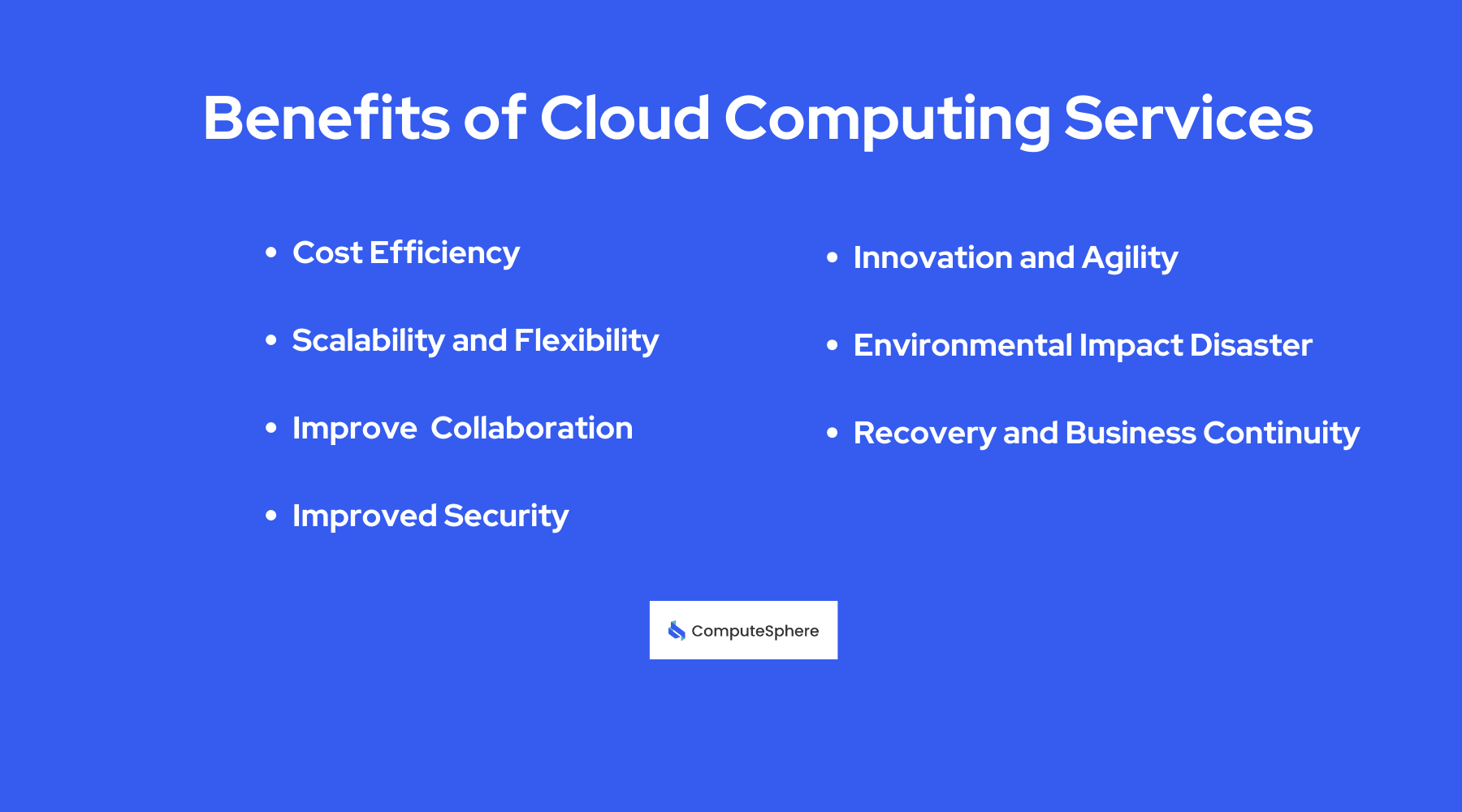Top 10 Advantages of Cloud Computing Services: A Comprehensive Guide

Modern businesses need to be flexible, secure, and collaborative. Cloud computing services provide a powerful online toolkit that enables growth without extensive hardware, ensures data security, and supports seamless teamwork from any location.
In this article, we will explore the numerous advantages of cloud computing and its role in modern business operations.
Benefits of Cloud Computing Services

Cost Efficiency
One of the most compelling benefits of cloud computing services is cost efficiency. Traditional IT infrastructure requires significant capital investment in hardware, software, and skilled personnel. In contrast, cloud services operate on a pay-as-you-go model, allowing businesses to pay only for what they use. This model reduces capital expenditure and shifts expenses to an operational cost, which can be scaled according to the business's needs.
For instance, a company experiencing seasonal peaks can increase its resources during high demand and decrease during off-peak periods. This flexibility ensures the best use of resources and significant cost savings. Real-world examples include companies like Netflix, which uses AWS (Amazon Web Services) to manage its fluctuating streaming demands, ensuring cost-effectiveness while delivering seamless service to its users.
Scalability and Flexibility
Scalability is another key benefit of cloud computing services. In a traditional IT setup, scaling up involves purchasing and setting up new hardware, which can be time-consuming and costly. Cloud services make it easy for businesses to add or reduce resources anytime.
This flexibility is particularly beneficial for startups and growing businesses. For example, a startup can begin with minimal resources and expand its cloud services as it grows, ensuring it only pays for what it needs. This scalability also supports businesses in handling sudden increases in demand without compromising performance. Companies like Airbnb and Uber have effectively used cloud computing to scale their operations globally, ensuring reliable service for millions of users.
Enhanced Collaboration
Cloud computing services significantly boost collaboration by enabling remote work and global teamwork. Employees can access and share data in real time, regardless of their location. This seamless access to information fosters better communication, teamwork, and productivity
Tools like Google Workspace and Microsoft 365 are prime examples of cloud services that facilitate real-time collaboration. These platforms allow multiple users to work on documents simultaneously, share updates instantly, and communicate through integrated messaging and video conferencing tools. The result is a more connected and efficient workforce, capable of responding quickly to business needs.
Disaster Recovery and Business Continuity
Ensuring business continuity during disasters is crucial for any organization. Traditional disaster recovery solutions can be expensive and complex to manage. Cloud computing services offer robust disaster recovery options, providing businesses with a cost-effective and reliable way to recover data and applications.
Moreover, cloud-based backup solutions ensure that data is continuously replicated and stored across multiple locations. In the event of a hardware failure, natural disaster, or cyber-attack, businesses can quickly restore their data and resume operations with minimal interruption. Companies like Dropbox and Amazon have built their disaster recovery strategies around cloud services, ensuring data integrity and business continuity even in adverse situations.
Improved Security
Security is often cited as a concern when moving to the cloud. However, cloud computing services have advanced security features that often exceed traditional IT security measures. Cloud providers invest heavily in security protocols, including data encryption, multi-factor authentication, and regular security audits.
Data stored in the cloud is encrypted, making it impossible for unauthorized users to access it. Access controls ensure that only authorized personnel can access sensitive information. Cloud providers also comply with industry standards and regulations, offering peace of mind to businesses regarding data security.
Companies like IBM and Microsoft provide strong security frameworks for their cloud services, helping businesses protect their data from breaches and cyber threats. The advanced security measures offered by cloud providers are often more advanced than what most companies can implement in-house.
Innovation and Agility
Cloud computing services drive innovation by providing access to cutting-edge technologies like artificial intelligence (AI), machine learning (ML), and the Internet of Things (IoT). These technologies are available on demand, allowing businesses to experiment and innovate without substantial upfront investments.
For example, AI and ML services offered by cloud providers enable businesses to analyze large datasets, gain insights, and automate processes. This leads to improved decision-making and operational efficiency. Companies like Spotify use cloud-based AI and ML to provide personalized recommendations to their users, enhancing user experience and engagement.
Additionally, the cloud's agility allows businesses to quickly develop and deploy applications. Developers can use cloud platforms to create, test, and launch applications faster, reducing time-to-market. This agility is a significant competitive advantage in industries where speed and innovation are critical.
Environmental Impact
The environmental benefits of cloud computing services are often ignored but are equally important. Traditional data centers consume a significant amount of energy and have a substantial carbon footprint. Cloud data centers, however, are designed for energy efficiency and sustainability.
Cloud providers invest in renewable energy sources and optimize their data centers to reduce energy consumption. For example, Google has committed to operating its data centers on carbon-free energy by 2030. By moving to the cloud, businesses can reduce their carbon footprint and contribute to environmental sustainability.
Conclusion
Cloud computing services offer a range of benefits that can transform businesses. From cost efficiency and scalability to improved collaboration and security, the advantages are clear and compelling. As more companies recognize these benefits, the adoption of cloud services continues to grow, driving innovation and efficiency across industries.
Additionally, by using cloud computing services, businesses can stay competitive, agile, and secure in an increasingly digital world. The journey to the cloud may seem daunting, but the rewards are well worth the effort. The future of business lies in the cloud, and those who embrace it will undoubtedly gain the benefits.
Contents
Built for Builders. Priced for Startups.
Tired of unpredictable cloud bills? ComputeSphere offers modular, fixed-cost cloud hosting that grows with your startup—no DevOps headaches, no surprises.
Get StartedShare this article
Browse Some Related Blogs
Relevant and related contents you can read









